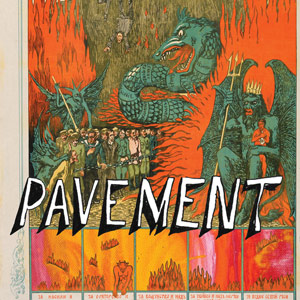
Quarantine the Past
Matador
Greatest hits albums aren’t really made for bands like Pavement. Half-pioneers and half-pranksters, the ’90s indie-rock idols didn’t release any singles that could rightfully be called “hits,” the closest being “Cut Your Hair,” which in 1993 got a sympathy invite to the U.S. Alternative Top Ten chart. Furthermore, the band’s first three studio albums are such classics in their own right (and their last two are no slouches either) that newcomers would be better served by picking up one or all of the expansive reissues of Slanted and Enchanted, Crooked Rain, Crooked Rain, and Wowee Zowee. (Don’t believe the hype: Wowee Zowee is every bit as essential as the other two.)
But hey, the newly reunited Pavement has got stadium seats to fill, and every newcomer isn’t patient enough to wade through an entire discography of songs, even if longtime fans would kill to relive that experience. So in anticipation of a possible U.S. tour, Matador has released Quarantine the Past, a 23-song retrospective that covers Pavement’s decade-long career from its unassumingly brilliant cassette-only beginnings to compelling flirtations with mainstream alternative rock. And while the record will be of little use to the initiated, it gives neophytes an excuse to finally find out what all the fuss is about.
And just what is all the fuss about anyway? Too strange for stardom, yet too catchy for obscurity, Pavement is one of those bands like the Velvet Underground before them that combined timeless melodicism with experimental structures and textures. In the process, they made changing the course of rock & roll history look easy, and of course making it look easy is just about the hardest thing there is. Many critics will point out that, in the beginning at least, lead singer and songwriter Stephen Malkmus was basically ripping off the Fall’s Mark E. Smith. But Smith never wrote songs as infectious and joyous as “Summer Babe,” nor was he able to conjure the pathos of songs like “Here” or “Zurich is Stained.” Cryptic as they were, the irony-shrouded emotions of those early tracks gave voice to a generation of ’90s listeners who missed the boat on—or simply missed the point of—grunge rock.
Pavement always existed just below the ceiling of the underground, and so there’s no clear delineation between the band’s “hits” and “misses.” Fortunately, that allows the song selection on Quarantine the Past to be as unpredictable and idiosyncractic as the band itself. The tracklist indulges in relative rarities like “Box Elder” as well as would-be hits like “Gold Soundz.” The sequencing, however, is problematic. Since the songs are not in chronological order, it’s difficult to sense the band’s evolution from left-of-the-dial stalwarts to tentative mainstream suitors. It’s more than a bit jarring to hear the lo-fi guitar squalls at the end of “Shoot the Singer (1 Sick Verse)” segue into the glistening Nigel Godrich–produced majesty of “Spit on a Stranger” without knowing how the band got from point A to point Z. And a lack chronology isn’t the only sequencing issue: “Fight this Generation” is a cool song and all, but it makes for a lousy last track considering that the band wrote some incredible closers in their day including “Our Singer,” “Fillmore Jive,” and “Carrot Rope.”
But I can’t argue too much about song selection. The great thing about a band as accomplished and consistent as Pavement is that, with the exception of a few no-brainers like “Cut Your Hair” and “Summer Babe,” one fan’s greatest hits will probably look nothing like another’s. As a longtime devotee, I’m biased against any formalized attempt to pare down a rich and varied career to an arbitrary and deceptively final “best of” list. But I’m sure there are listeners out there for whom 23 Pavement tracks is more than enough. God knows I’m perfectly content listening to greatest hits collections of casual favorites like the Cure and the Who, and those artists have much bigger followings than lowly old Pavement.
But despite Pavement’s history as being a bit of an underdog in the public eye, the band’s fanbase has ballooned in the 10-year period following their break-up, as evidenced by the internet hysteria over their reunion. During their initial run, the mainstream success Pavement half-heartedly craved was always just out of reach. Now the masses are finally catching up.
David Holmes
MP3: “Gold Soundz”
PAST PERFECTS
Buzzcocks, Another Music in a Different Kitchen, Love Bites, and A Different Kind of Tension
Frank Sinatra, Strangers in the Night
Next Stop... Soweto
Good God! Born Again Funk
Animal Collective, Campfire Songs
13th Chime, The Lost Album
Tin Huey, Before Obscurity: The Bushflow Tapes
Jawbox, For Your Own Special Sweetheart
Interference, Interference
U2, The Unforgettable Fire
Isaac Hayes, Shaft
Pylon, Chomp More
Nirvana, Bleach
Harmonia and Eno '76, Tracks and Traces
